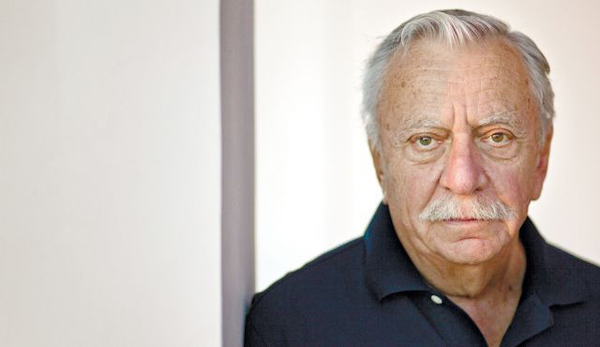Arts Commentary: Getting ‘em in the Door
By Debra Cash
For the foreseeable, capitalist American future, full and equitable access to live, professional performing arts will depend on subsidy.

Producer Emanuel Azenberg. Photo: NYU.edu
Local theatrical producer and choreographer Josie Bray, whose Trevor The Musical, taped before it closed off-Broadway, has been acquired for streaming on Disney+, recently cross-posted an interesting, modestly contrarian statement from a man who, early in her career, gave her advice on how to become a producer.
Emanuel Azenberg recently gave a TEDx Broadway talk which will be available to stream. (Massachusetts Cultural Council Executive director Michael Bobbit is among the featured speakers).
Azenberg, who is almost 90, has been around the block, and he didn’t mince words.
“If you really want to change the diversity [of professional theater], then, once a month, Broadway should provide every show for nothing. [And offer tickets to] every high school in the metropolitan area for the next 15 years. The door has to open. Nobody knows about the theater at 174th Street in the Bronx. Somebody opens the door and they’ll go ‘hey, maybe there’s a place for me.’”
Azenberg’s argument isn’t solely economic. He seems to have plenty of things to say about Broadway losing much of its aesthetic way to spectacle, and yes, Disneyfication (sorry, Trevor!) Nor do his comments address the challenge of making the offerings of theater and other cultural organizations more reflective of BIPOC communities, a point explored in both qualitative and quantitative terms by a recent Slover Linett research study, Culture + Community in a Time of Transformation.
Yet experiencing live, professional performance remains a matter of “discretionary” spending. It’s a hard sell to convince people to part with scarce funds for anything other than the pop culture name brand Sure Thing or the organization they already know and love. During pandemic shut downs, watching something online — free, pay what you will, or as part of an “all you can eat” streaming subscription — increased the appetite for risk-taking because very simply, it decreased the risk.
It shouldn’t be a surprise that, given the overlap in demographic/identity groups and economic/class strata, the respondents in the Slover Linett study who experienced the arts in “digital only” formats were much more demographically diverse than recent in-person attendees. Nor does it seem odd that more than 60 percent of the study’s Massachusetts respondents said they deeply valued the availability of free online content. For many people I know, both struggling and affluent, the challenge was deciding which content to view out of an abundance of options.
Azenberg, the Broadway producer, was focusing his attention on the exorbitant cost of attending a Broadway show. I don’t begrudge Broadway producers and the (unionized!) artists they employ their percentages and salaries, and understand that these activities are central to New York City’s tourist economy.
But if Azenberg is even partly right, the answer isn’t putting everything online for cheap, it’s getting ’em in the door in person. Live performance is simply different than videotaped or even livestreamed online content, even when that mediated version is splendidly produced. But the only thing that conveys the visceral power of live performance is — wait for it — the experience of live performance, whether that experience comes from hearing a saxophone busker on the street or settling into an orchestra seat for Hamilton.
It comes down to money. Offering free days at the museum may not cost a lot, because museum overhead is pretty constant — you don’t have to keep paying salaries to the paintings and sculpture even if the ticket sellers and guards are on the clock. Providing free Broadway performances – any performances where the artists, technicians, and venue are paid — is expensive. Free tickets for cadres of high school students are hard to envision at a time when arts education is only lately emerging from more than a generation of neglect.
But why not? If we believe in the arts, we should believe in investing in audiences to make it possible for everyone to experience both art that reflects our experiences and work that may lie far outside it. We do that with public libraries. Censorship threats aside, those institutions and their workers have kept the appetite for books vital.
For the foreseeable, capitalist American future, full and equitable access to live, professional performing arts will depend on subsidy. Subsidy may flow from corporate sponsorship, from philanthropy, from government appropriations or some scheme as yet to be invented (how about a live performance tax on every Amazon Prime, Netflix, and HBO Max subscription?).
But that will be a small price to pay for a more robust, humane and arts-engaged future.
Debra Cash is Executive Director of Boston Dance Alliance and a founding contributing writer and Board member of the Arts Fuse. The opinions in this essay are her own.

Here is an Azenberg sentiment, quoted in the New York Theatre article, that struck me: “We don’t have an agreed upon criteria for quality. The value and aesthetics and taste have been devalued.” That is partly a critical failure — there is no meaningful public debate about “criteria for quality” among critics, who should be setting an example. Most of the analysis is speculating about the success or failure of a production, either at the box office or as a candidate for streaming. Decline of quality? Few touch the issue ….